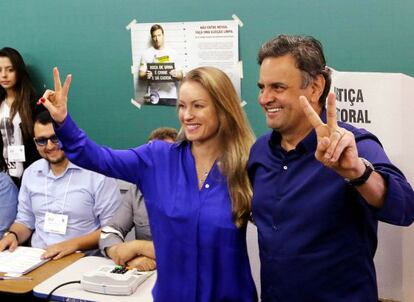Aécio Neves to challenge Rousseff in Brazil presidential runoff
Marina Silva is the big loser in first round, which was too close to give an outright victory


Brazilian President Dilma Rousseff, of the leftist Workers’ Party (PT), and Aécio Neves, of the Social Democrats (PSDB), will face each other in the October 26 runoff that will decide the country’s next leader.
The big loser in Sunday’s first round was Socialist Party (PSB) candidate Marina Silva, who just a few weeks ago was leading voting intention surveys, but ultimately fell out of grace.
With 93.5 percent of votes counted, Rousseff had secured 41.08 percent of ballots, not enough for a definitive victory, while Neves made a surprising last-minute rally to obtain 34.2 percent. Silva was eliminated from the race with 21.14 percent.
In early September, with his support hovering around 14 percent, Neves was being ruled out by nearly everyone.
The rollercoaster of voter sentiment is a reflection of an unpredictable campaign that was marked by the August 13 plane crash that killed Eduardo Campos, the original Socialist presidential candidate.
Neves will try to convince Silva’s disappointed followers that he will set the economy straight
His death catapulted his number two, Marina Silva, to the forefront of the campaign. In a country that is officially secular but deep down very religious, many people thought destiny had played a role in the fact that Silva made a last-minute decision not to board the plane that crashed. And Silva, an Evangelical Christian, made the most of that wave of support.
But this sent alarms off in the PT, the only political group with a true party structure in Brazil and in power for the last 12 years, first with Lula da Silva and then with Rousseff. And the latter, who has a reputation for ruthlessness, called in her aides and decided that the enemy to beat was not Neves but Silva.
And so the PT went on the attack, led by Rousseff herself, who used the televised debates to underscore the contradictions in Silva’s campaign promises on environmental and economic issues.
The president also had the advantage of more air time on television – as Brazilian legislation allowed – and made the most of it: one controversial campaign ad showed a family who suddenly saw the food on its table disappear by virtue of the power held by invisible bankers. The message was evident: if voters elected Marina Silva, considered to be to the right of the PT and allegedly more likely to give power to the banks, many of the social gains made by poor Brazilians under the Worker’s Party could suddenly be lost.
The fact that Rousseff came out as the front runner did not come as a huge surprise. For the last 10 days, the president had enjoyed a comfortable lead in the polls.
Rousseff will remind poor voters of the social achievements her party has made in the last 12 years
Meanwhile Neves, heir to the liberal and stabilizing policies of former president Fernando Henrique Cardoso, was aware that Rousseff would win round one of the election no matter what, and decided to aim his attacks at Silva as well, focusing on the fact that she had belonged to the PT for 20 years before switching to the Socialists. He presented himself as the only alternative for “real change.”
Now it will be up to the people who voted for Silva to decide which of the two remaining candidates gets to rule Brazil for the next four years. Neves, whose voters are mostly middle class, will try to convince Silva’s disappointed followers that he will set the economy straight, balance the national accounts and pull the industry out of its current stagnation. Meanwhile, Rousseff will focus on poor voters and remind them of the social achievements her party has made in the last 12 years.
Anything could happen in the three weeks remaining in a presidential campaign that will be remembered for its surprising twists and turns.
Tu suscripción se está usando en otro dispositivo
¿Quieres añadir otro usuario a tu suscripción?
Si continúas leyendo en este dispositivo, no se podrá leer en el otro.
FlechaTu suscripción se está usando en otro dispositivo y solo puedes acceder a EL PAÍS desde un dispositivo a la vez.
Si quieres compartir tu cuenta, cambia tu suscripción a la modalidad Premium, así podrás añadir otro usuario. Cada uno accederá con su propia cuenta de email, lo que os permitirá personalizar vuestra experiencia en EL PAÍS.
En el caso de no saber quién está usando tu cuenta, te recomendamos cambiar tu contraseña aquí.
Si decides continuar compartiendo tu cuenta, este mensaje se mostrará en tu dispositivo y en el de la otra persona que está usando tu cuenta de forma indefinida, afectando a tu experiencia de lectura. Puedes consultar aquí los términos y condiciones de la suscripción digital.








































